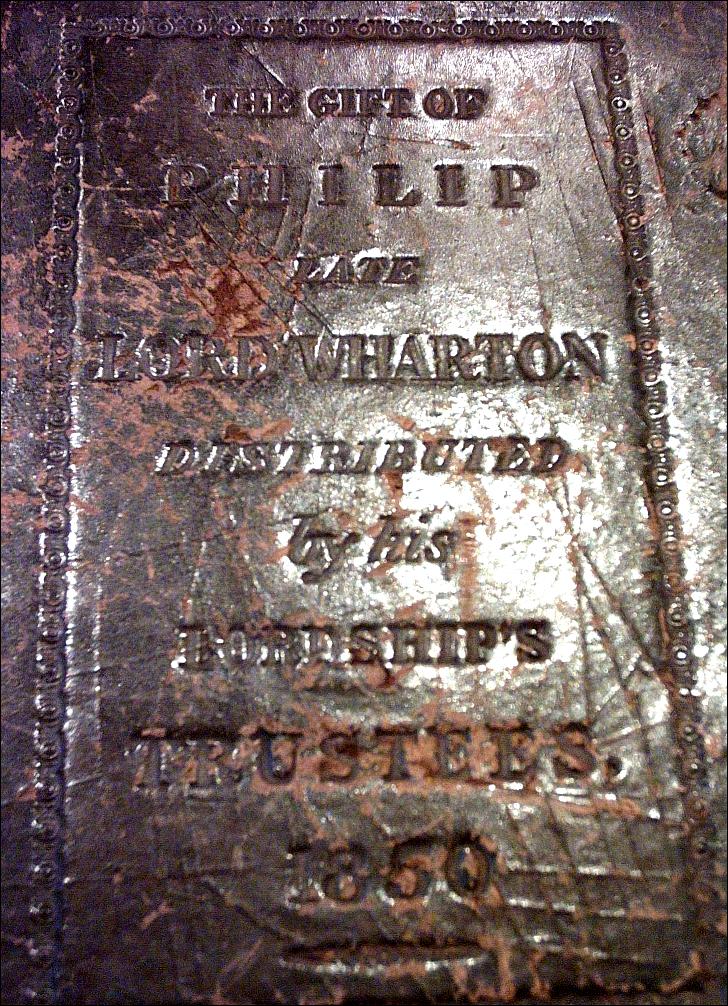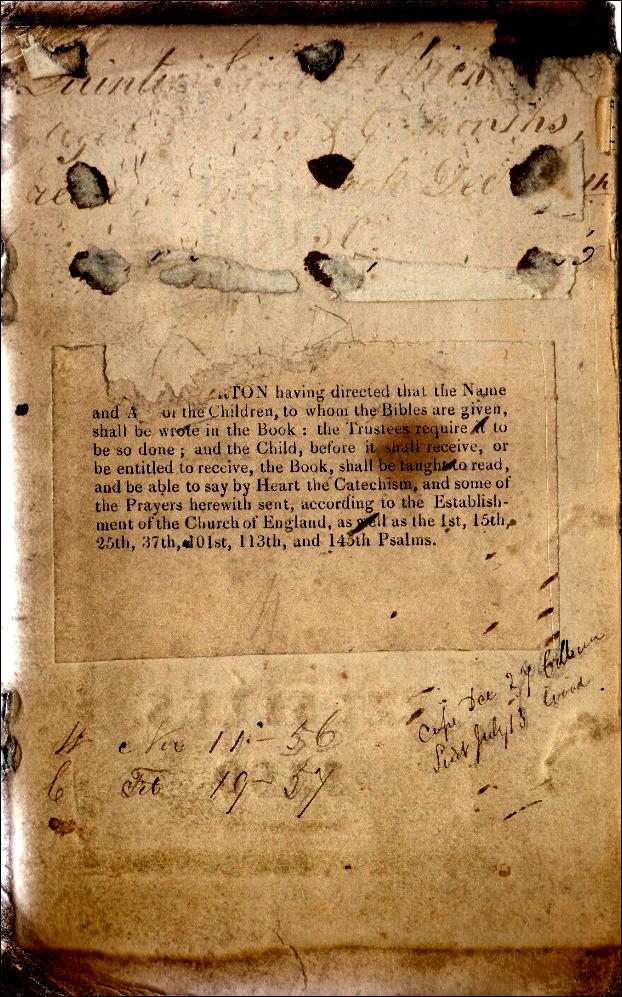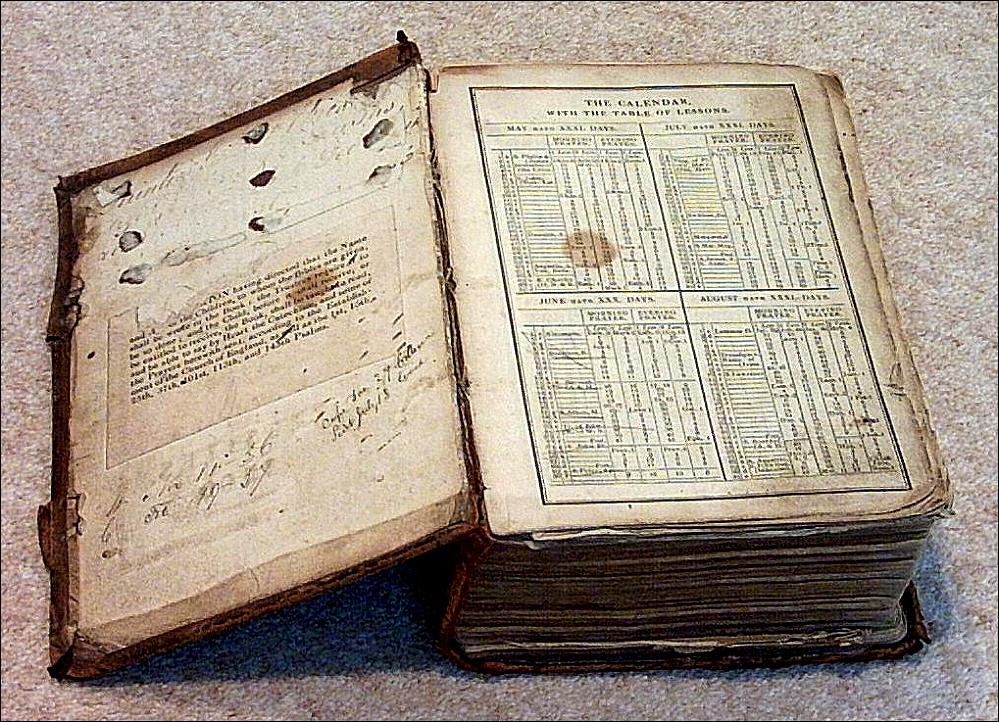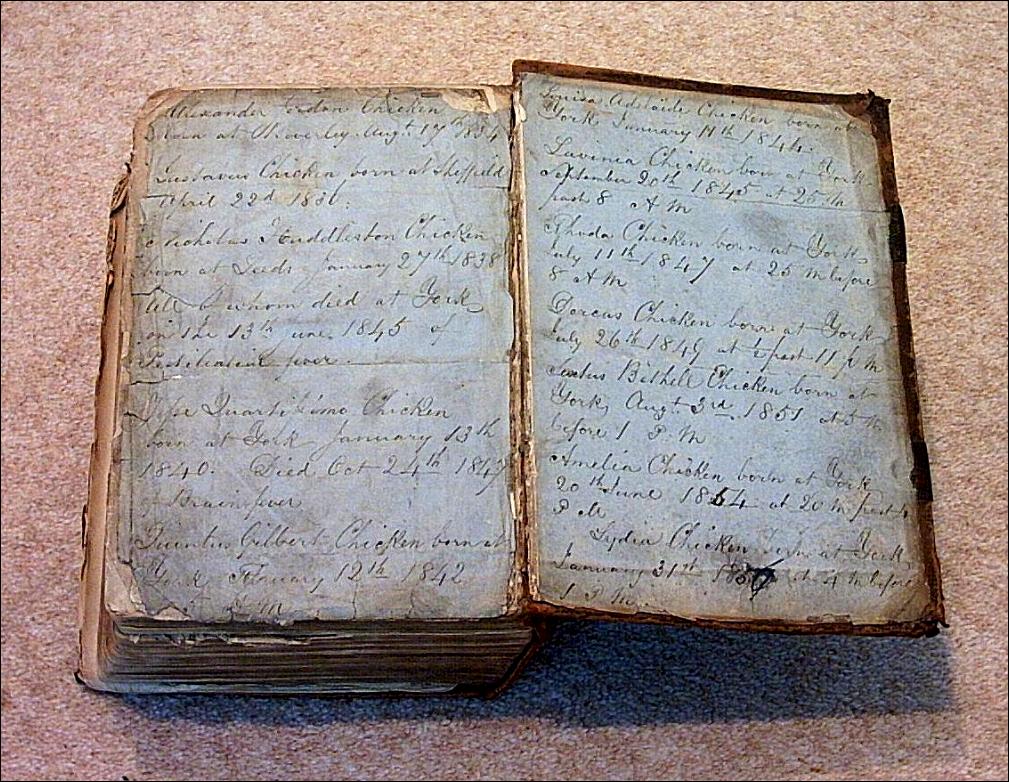

THE GIFT OF
PHILIP
LATE
LORD WHARTON
DISTRIBUTED
by his
LORDSHIP’S
TRUSTEES
1850

Handwritten:
Quintus Gilbert Chicken
Aged —— & 9 months
Received —— book Dec —th
Pasted-in slip:
| —————————TON having directed that the Name
and Age of the Children, to whom the Bibles are given, shall be wrote in the Book: the Trustees require it to be so done; and the Child, before it shall receive, or be entitled to receive, the Book, shall be taught to read, and be able to say by Heart the Catechism, and some of the Prayers herewith sent, according to the Establish- ment of the Church of England, as well as the 1st, 15th, 25th, 37th, 101st, 113th and 145th Psalms. |


| Alexander Jordan Chicken
born at Beverley. Augt 17th 1834 Gustavus Chicken born at Sheffield
Nicholas Huddleston Chicken
All of whom died at York
Jefe Quartifimo Chicken
Quintus Gilbert Chicken born at
|
Louisa Adelaide Chicken born at
York January 11th 1844. Lavinia Chicken born at York
Rhoda Chicken born at York
Dorcas Chicken born at York
Sextus Bethell Chicken born at
Amelia Chicken born at York
Lydia Chicken born at York
|

This Bible was in the possession of my father for as long as I can remember. When my father died in 2000, I assumed ownership of it.
From the faded writing inside the front cover, we know that the book was presented to Quintus Gilbert Chicken, son of Richard and Louisa Chicken. Quintus has written that he was “aged —— and nine months” at the time. As the front cover of the book tells us that it was distributed in 1850, and as Quintus was born in February 1842, he must have been eight years old at the time he received it, which would have made the distribution November 1850. By that time, nine children had been born to Richard and Louisa, of whom five had already died.
Did it stay in Quintus’s possession? Inside the back cover is written the name, date and place of birth of all twelve of Richard and Louisa’s children. Deaths before 1847 are also noted. Strangely, the deaths of the first four children (Alexander, Gustavus, Nicholas and Jesse) are noted, but not that of Louisa, who died only six days after Alexander, Gustavus and Nicholas. Jesse died two years later. Rhoda and Amelia also failed to make it to adulthood but their deaths are not noted in the Bible: only the deaths of the boys.
Who made these entries? It could have been Quintus, but it seems an unlikely thing for a young boy to do. Also, and significantly, the writing has been evenly spaced to fit perfectly onto the last page and the inside-back-cover of the Bible. It gives every impression of having all been written at one sitting, and with the same pen, throughout. [Exception: the entries for Amelia and Lydia have alterations. The Amelia entry appears to have been corrected by the same hand, pen and ink that wrote the original entry — a slip of the pen perhaps? The Lydia entry has definitely been altered at a later date and with different ink. My guess is that Lydia was altering her age for some reason.] The fact that the spacing accommodates entries for all the children suggests it was written after (maybe long after?) the birth of the last child, Lydia.
So, if it was all written at the same time, one assumes that it was either Louisa (the mother) or Richard (the father) who wrote it. I have in my possession some photocopies of hand-written letters by both Richard and Louisa. I have no experience of interpreting handwriting, but superficially it looks to me like Richard’s writing in the Bible.
Richard died in January 1866 in the York poorhouse. Louisa had already moved to Leeds. I assume that she would have taken the family possessions with her, so the Bible may have already been amongst her belongings when Richard died.
At the time Richard died, Quintus had left home. In September 1860, he had married and his first son had been born around 1864/5, probably in India. Two more of Quintus’s children were born in India before he finally returned to the UK sometime after 1870. There is evidence that Quintus had a connection with Colchester and he may have been in the army. It would seem that Quintus did not take his Bible with him when he left home.
By the time of the 1871 census Richard’s widow, Louisa was living in Leeds with her daughters Lavinia, Dorcas and Lydia. Also a couple of lodgers.
By 1881, Dorcas had married the lodger, Charles Baker, and was living in Leeds with her first two children. Her mother, Louisa, was living with them. Louisa died in February 1883.
My guess is that Louisa had the Bible in her possession and on her death it passed to Dorcas.
So how did the Bible come to me?
Charles and Dorcas Baker had three children, Edward, Emma and George. George was my grandfather. Edward and George both married and raised families. Emma Baker remained unwed and was a teacher in Leeds for most of her life.
George had married on the 21st January 1911. Amongst the witnesses were his mother, Dorcas Baker, and his sister Emma Baker.
I’m told that, at some point, George fell out with his mother, Dorcas, and had nothing more to do with her. A few years ago, I started to collect family information from my parents. My father knew only his maternal grandparents and wasn’t able to tell me anything at all about his paternal grandparents (Dorcas and Charles) other than the fact that his grandmother’s maiden name had been Chicken. He didn’t know her first name and, as far as I am aware, he’d never heard of Richard Chicken and didn’t know that all the names in the Bible were names of one family. Also, after my father’s death, my mother told me that George Baker (her father-in-law and my Grandfather) never, ever, spoke about his parents and no-one knew anything about them. My mother found this very odd!
So, it would seem that Dorcas had the Bible and it passed to her daughter Emma. Maybe Dorcas and the unmarried Emma had lived together up to the time of Dorcas’s death. By the time I knew of Emma, she was living in Adel, Leeds, close to her unmarried cousin, Agnes (“Aggie”) Barker, daughter of Lavinia Chicken and George Barker. (Don’t confuse George Baker, Dorcas’s son and George Barker, Dorcas’s brother-in-law!) Emma and Aggie were only a short bus ride from my family’s home in Headingley, and I can just about remember my Great Aunt Emma. I know that Emma was alive in 1953 when my brother was born, but I believe she may have died sometime shortly after that. When she died, her brother George and his wife Mamie cleared out her bungalow in Adel. My mother says that George and Mamie gave the Bible to their son Peter (my father), saying something like, “You might as well have this”.
To sum up:
Sandra Midgley